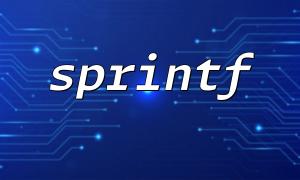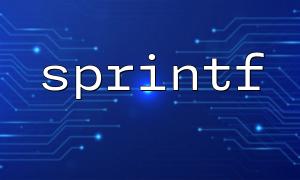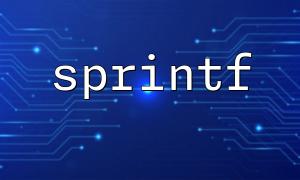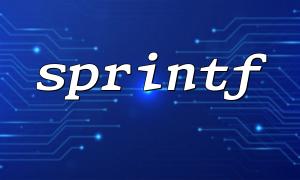In PHP programming, the sprintf function is a very commonly used formatted output function. It allows us to format variable values into strings in the specified format, which are usually used to generate dynamic content and output. However, when using sprintf in a multi-language environment, you may encounter garbled code problems. This problem is usually related to character encoding and localization settings. This article will analyze why this kind of garbled code appears and discuss how to solve this problem.
Character encoding is inconsistent In multi-lingual environments, character encoding processing is very important. PHP uses ISO-8859-1 or UTF-8 encoding formats by default. If your input data or system default character set is inconsistent with the character set processed by sprintf , it may cause garbled problems. For example, when you get data from a database, the database uses UTF-8 encoding, while PHP uses ISO-8859-1 encoding by default for processing, and garbled code appears when formatting the string.
Locale is inappropriate. The setlocale() function in PHP is used to set the locale of the current environment. Locale settings include language, currency, date format and other information. If locale is not set correctly in a multi-language environment, the sprintf function may use inappropriate formatting rules, causing character display exceptions.
A string contains special characters Garbage can also be caused if the string contains non-ASCII characters (such as Chinese, Japanese, or other special characters) and the sprintf does not correctly identify the encoding format when processing.
The most basic solution is to ensure that all strings involved in PHP code are uniformly encoded, and UTF-8 is recommended. First, make sure that the database, PHP files, and browsers are encoded using UTF-8.
Add the following code to the top of the PHP file to set the character set:
header('Content-Type: text/html; charset=UTF-8');
If the database is UTF-8 encoding, it is also necessary to ensure that PHP matches the database's character set. You can set the character set when the database connection is connected:
mysqli_set_charset($conn, 'utf8');
In a multi-language environment, the setlocale() function is used to set the current locale environment. Make sure that the zone information is set correctly before using sprintf . For example, if your system supports Chinese, you can set it like this:
setlocale(LC_ALL, 'zh_CN.UTF-8');
In this way, the sprintf function will follow the correct formatting rules to avoid garbled code.
PHP provides a multibyte character set (mbstring) extension that is specifically used to process strings containing multibyte characters. You can use the mb_sprintf function instead of sprintf , which handles multibyte characters and avoids garbled code.
Sample code:
echo mb_sprintf("Hello,%s!", $name);
When using mb_sprintf , make sure you have installed and enabled the mbstring extension.
When you process URLs in your code, especially when string stitching or passing them to external interfaces, make sure that the domain name of the URL is consistent with the domain name you are actually using. If you have a domain name in the URL that needs to be replaced, you can use str_replace() to dynamically modify the domain name. For example:
$url = 'https://www.example.com/somepath';
$url = str_replace('www.example.com', 'gitbox.net', $url);
This way, you can make sure that all URLs are correctly pointing to the gitbox.net domain name.
The root cause of garbled code when using sprintf in a multi-language environment is usually character encoding and locale settings issues. By ensuring that the encoding is consistent, setting Locale correctly, using mb_sprintf and other methods, the garbled problem can be effectively avoided. Finally, if your code involves URL replacement, remember to make sure the domain name is accurate and can be handled with string replacement.















